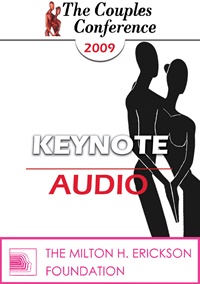
- Average Rating:
- Not yet rated
- Topic Areas:
- Workshops | Couples Therapy | Marriage | Intimacy | Forgiveness
- Categories:
- Couples Conference | Couples Conference 2005
- Faculty:
- Janis Abrahms Spring, PhD, ABPP
- Duration:
- 1:59:31
- Format:
- Audio Only
- Original Program Date:
- Mar 04, 2005
- Short Description:
- Forgiveness has been held up as the gold standard of recovery from intimate wounds. Often people find forgiveness too generous, particularly when the offender is unrepentant. Dr. Spring proposes a bold, new healing alternative that lets us make peace with the past- with or without forgiving.
- Price:
- $15.00 - Base Price

- Average Rating:
- Not yet rated
- Topic Areas:
- Workshops | Couples Therapy | Neurobiology | Relationships | Neuroscience | Intimacy
- Categories:
- Couples Conference | Couples Conference 2005
- Faculty:
- Pat Love, EdD
- Duration:
- 1:40:11
- Format:
- Audio Only
- Original Program Date:
- Mar 04, 2005
- Short Description:
- The new brain science explains many of the mysteries of love and offers new hopes for troubled relationships. Neuro-scientific approaches are used to address the most common reason cited for divorce, i.e. growing apart. Three clinical techniques will be presented which are specifically designed to create an intimate bond between two people and pave the way to grow together instead of apart. Lecture, video, handouts and experiential exercises will be used.
- Price:
- $15.00 - Base Price

- Average Rating:
- Not yet rated
- Topic Areas:
- Workshops | Couples Therapy | Sex and Sexuality | Intimacy | LGBTQ
- Categories:
- Couples Conference | Couples Conference 2008
- Faculty:
- Esther Perel, MA, LMFT
- Duration:
- 2:00:39
- Format:
- Audio Only
- Original Program Date:
- Apr 26, 2008
- Short Description:
- The story of sex in committed modern couples is one that often tells of a dwindling desire that includes a long list of sexual alibis, claiming to explain the inescapable death of Eros. The absence of fantasy, the proliferation of pornography and affairs, as well as a lack of understanding of the nature of erotic desire all contribute to the predicament. This workshop examines the cultural pressures that shape domesticated sex and the puzzling inverse correlation between greater emotional intimacy and the loss of sexual desire.
- Price:
- $15.00 - Base Price

- Average Rating:
- Not yet rated
- Topic Areas:
- Workshops | Couples Therapy | Neuroscience | Intimacy | Attachment | Neurobiology
- Categories:
- Couples Conference | Couples Conference 2008
- Faculty:
- Stan Tatkin, PsyD, MFT
- Duration:
- 2:08:28
- Format:
- Audio Only
- Original Program Date:
- Apr 27, 2008
- Short Description:
- Is our brain built for love or war, connection or self-preservation? The attachment drive for a secure base involves neurological and neuro-endocrine systems and subsystems that determine such things as proximity seeking and contact maintenance. Couples most commonly enter therapy due to repeated, anticipated, and intense periods of mutual dysregulation whereby attachment injuries and adaptations become reanimated. In order to make the most of attachment theory, the psychotherapist must incorporate a working knowledge of the neurobiological processes that underlie all primary attachment relationships.
- Price:
- $15.00 - Base Price

- Average Rating:
- Not yet rated
- Topic Areas:
- Workshops | Couples Therapy | Multicultural | Sex and Sexuality | Intimacy
- Categories:
- Couples Conference | Couples Conference 2008
- Faculty:
- Esther Perel, MA, LMFT
- Duration:
- 2:16:00
- Format:
- Audio Only
- Original Program Date:
- Apr 27, 2008
- Short Description:
- Couples’ expectations about the role of sexuality in intimate relationships have changed dramatically over the past 40 years. We will explore the main ideas of the romantic ideal: how we want our partner to fulfill our needs for connection, belonging and continuity, as well as give the sense of transcendence, mystery and passion. Examining the cultural values of love and respect, freedom and responsibility, and interdependence vs. autonomy, we will map a culturally relevant approach to work with the dilemmas of desire in couples. We also will probe the difference between clearly assigned gender role repartition and the post-feminist egalitarian model.
- Price:
- $15.00 - Base Price

- Average Rating:
- Not yet rated
- Topic Areas:
- Workshops | Couples Therapy | Neuroscience | Intimacy
- Categories:
- Couples Conference | Couples Conference 2008
- Faculty:
- Louis Cozolino, PhD
- Duration:
- 2:23:03
- Format:
- Audio Only
- Original Program Date:
- Apr 27, 2008
- Short Description:
- In the course of human evolution, our brains have been shaped by countless adaptational challenges resulting in an organ functioning simultaneously in the conscious present and our primitive and hidden past. This presentation will explore aspects of the human brain which make sustained intimate relationships both possible and problematic.
- Price:
- $15.00 - Base Price

- Average Rating:
- Not yet rated
- Topic Areas:
- Keynotes | Couples Therapy | Sex and Sexuality | Intimacy
- Categories:
- Couples Conference | Couples Conference 2009
- Faculty:
- Esther Perel, MA, LMFT
- Duration:
- 53:02
- Format:
- Audio Only
- Original Program Date:
- May 02, 2009
- Short Description:
- CC09 Keynote 03 - Mating and Captivity: The Paradox of Sex and Intimacy - Esther Perel, MA, LMFT
- Price:
- $15.00 - Base Price

- Average Rating:
- Not yet rated
- Topic Areas:
- Workshops | Attachment | Couples Therapy | Developmental Therapy Model | Differentiation | Intimacy
- Categories:
- Couples Conference | Couples Conference 2009
- Faculty:
- Ellyn Bader, PhD
- Duration:
- 1:19:52
- Format:
- Audio Only
- Original Program Date:
- May 01, 2009
- Short Description:
- Using a developmental lens is a powerful way to lead couples to make sustained change. Learn how developmental principles can help you assess what is wrong and then guide and shape your treatment decisions. Videotapes and clinical case examples will be used throughout the workshop to demonstrate how to challenge symbiosis, facilitate differentiation and build the capacities to sustain intimacy.
- Price:
- $15.00 - Base Price

- Average Rating:
- Not yet rated
- Topic Areas:
- Workshops | Couples Therapy | Intimacy | Avoidant
- Categories:
- Couples Conference | Couples Conference 2009
- Faculty:
- Ellyn Bader, PhD
- Duration:
- 1:23:01
- Format:
- Audio Only
- Original Program Date:
- May 02, 2009
- Short Description:
- Couples who appear warm and friendly can be deceptively difficult. They fear intensity, anger and deep involvement. We will focus on principles for managing sessions, core competencies required in the therapist, and what it takes to support each partner's development to enable more intimacy and sexuality.
- Price:
- $15.00 - Base Price
Tags: Avoidant Couples Therapy Intimacy

- Average Rating:
- Not yet rated
- Topic Areas:
- Workshops | Couples Therapy | Sex and Sexuality | Intimacy
- Categories:
- Couples Conference | Couples Conference 2009
- Faculty:
- Esther Perel, MA, LMFT
- Duration:
- 1:35:22
- Format:
- Audio Only
- Original Program Date:
- May 02, 2009
- Short Description:
- The story of intimacy and sexuality in committed modern couples is one that often tells of dwindling desire and includes a long list of sexual alibis, claiming to explain the inescapable weakening of erotic connection. The absence of fantasy, the proliferation of pornography and affairs, as well as a lack of understanding of the nature of erotic desire all contribute to the depression, loneliness and despair. In this workshop we will probe the intricacies of love and desire. Through case examples and video vignettes, Ms. Perel will introduce innovative strategies for partners to take emotional risks when negotiating their dual needs for connection and autonomy, predictability and passion. This model applies to young, old, married and not, heterosexual and same sex couples.
- Price:
- $15.00 - Base Price
Please wait ...

